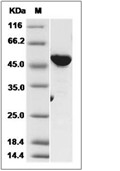Shopping Cart
Remove All Your shopping cart is currently empty
Your shopping cart is currently empty
VRK1 Protein, Human, Recombinant is expressed in Baculovirus insect cells. The predicted molecular weight is 45.6 kDa and the accession number is Q99986.

| Pack Size | Price | USA Warehouse | Global Warehouse | Quantity |
|---|---|---|---|---|
| 5 μg | $94 | 7-10 days | 7-10 days | |
| 10 μg | $152 | 7-10 days | 7-10 days | |
| 20 μg | $252 | 7-10 days | 7-10 days | |
| 50 μg | $498 | 7-10 days | 7-10 days |
| Biological Activity | Kinase activity untested |
| Description | VRK1 Protein, Human, Recombinant is expressed in Baculovirus insect cells. The predicted molecular weight is 45.6 kDa and the accession number is Q99986. |
| Species | Human |
| Expression System | Baculovirus Insect Cells |
| Tag | Tag Free |
| Accession Number | Q99986 |
| Synonyms | vaccinia related kinase 1,PCH1A,PCH1 |
| Construction | A DNA sequence encoding the human VRK1 ( Q99986 ) (Met 1-Lys 396) was expressed and purified with two additional amino acids (Gly & Pro ) at the N-terminus. Predicted N terminal: Gly |
| Protein Purity | > 95 % as determined by SDS-PAGE  |
| Molecular Weight | 45.6 kDa (predicted); 47 kDa (reducing condition, due to glycosylation) |
| Endotoxin | < 1.0 EU/μg of the protein as determined by the LAL method. |
| Formulation | Supplied as sterile 20 mM Tris, 500 mM NaCl, 10% glycerol, pH 7.4. |
| Reconstitution | A Certificate of Analysis (CoA) containing reconstitution instructions is included with the products. Please refer to the CoA for detailed information. |
| Stability & Storage | It is recommended to store the product under sterile conditions at -20°C to -80°C. Samples are stable for up to 12 months. Please avoid multiple freeze-thaw cycles and store products in aliquots. |
| Shipping | Proteins are shipped with blue ice. |
| Research Background | VRK1 is a member of the vaccinia-related kinase (VRK) family of serine/threonine protein kinases. Serine/threonine protein kinases are tumor suppressor that controls the activity of AMP-activated protein kinase family members, thereby playing a role in various processes such as cell metabolism, cell polarity, apoptosis and DNA damage response. VRK1 contains 1 protein kinase domain and localizes to the nucleus. VRK1 gene is widely expressed in human tissues and has increased expression in actively dividing cells, such as those in testis, thymus, fetal liver, and carcinomas. As a serine/threonine kinase, VRK1 phosphorylates 'Thr-18' of p53/TP53 and may thereby prevent the interaction between p53/TP53 and MDM2. Defects in VRK1 are the cause of pontocerebellar hypoplasia type 1 (PCH1), also called pontocerebellar hypoplasia with infantile spinal muscular atrophy or pontocerebellar hypoplasia with anterior horn cell disease. PCH1 is characterized by an abnormally small cerebellum and brainstem, central and peripheral motor dysfunction from birth, gliosis and anterior horn cell degeneration resembling infantile spinal muscular atrophy. |
| Size | Quantity | Unit Price | Amount | Operation |
|---|

Copyright © 2015-2026 TargetMol Chemicals Inc. All Rights Reserved.